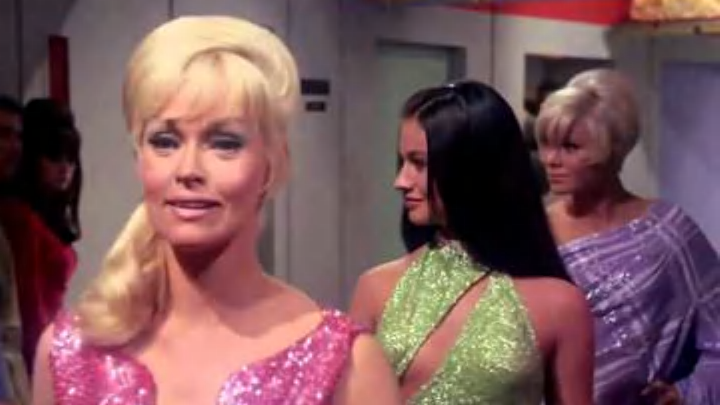When “Mudd’s Women” (S01E13) aired, it appeared to offer a positive message for women watching. After all, at the end of the story, Eve and the others find the husbands they’ve been longing for, Harry Mudd gets his comeuppance, and the women appear to live happily ever after with their miner husbands. However, while this tale might have a Disneyesque ending, when you scratch the surface, it is not the feminist example some Star Trek viewers view it as.
Themes of exploitation run deeper than expected
When the women first appear, they seem to be under Harry Mudd’s thumb; he doesn’t let any of them speak for themselves and refuses to allow Dr. McCoy to examine them. They don’t seem to have much in the way of personal independence, and Harry seems more their keeper than someone ferrying them throughout the galaxy.
Later, when Eve reveals that they aren’t slaves or prostitutes but lonely women looking for husbands because there are no eligible bachelors where they come from, the narrative swings towards feminism—the women have power over the men onboard Enterprise thanks to the Venus drug, and when Eve beams down to the mining colony to meet the men and the Venus drug begins to wear off, she’s capable and intelligent beneath the allure of all that fake beauty.
The feminist lens slips
The man who first sets eyes on her, Ben Childress, is first enchanted and then disappointed and even angry when her beauty fades. Furious, she takes another dose of the drug (or so it seems) and becomes beautiful once more, asking Childress if he’d rather have a vain and helpless woman or someone his equal who wants to share a life and a marriage.
Here, unfortunately, is where the lens slips away from a feminist viewpoint. Kirk reveals that the last dose of Venus drug was a placebo and that it is her self-esteem that makes her truly beautiful. It’s a Dumbo and the magic feather story because in the end, it is Kirk who saves the day with a dose of “colored gelatin” and mansplaining. While Eve and Ben might end up happy, it’s uncertain whether she’ll remain his complete equal.
Do you think “Mudd’s Women” was feminist for its time, and how well do you think it holds up today? Come on over to our social media pages and join the conversation about this episode and much more!
